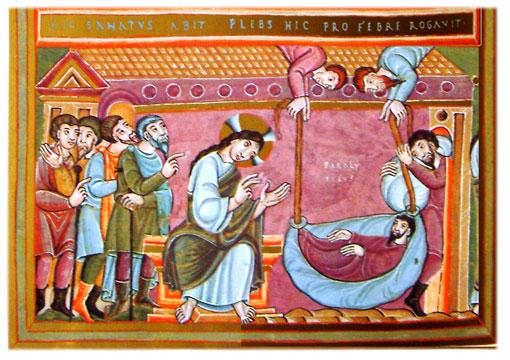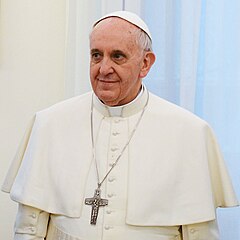THE QUESTION
On the
August 27, 2013 Coast to Coast radio show George Noory interviewed Catholic historian
Charles Coulombe on a variety of topics during the last three hours of the show. Coulombe was consistently excellent, had his facts about Church teaching straight, expressed himself succinctly and charitably, and very well-represented the Church to members of an audience that might not otherwise ever hear an accurate portrayal of Church matters.
After listening to the entirety of the interview, I only wished he would have expounded more on one issue. The issue was raised by a caller, Ray in Niles, OH, who asked the following (emphasis mine):
When we say that people who are evil would deserve hell and those who lead virtuous lives deserve heaven, that makes rational sense. But the problem I've always had with the
Church and with Christianity in general is that you're condemned to hell for the flimsiest of reasons. For example, you're required to believe a matter of fact that Christ was divine and the Incarnation. Now let's suppose a person leads a virtuous life but doesn't happen to believe that. That doesn't make them evil. I mean, if I believe, for example, that the Eiffel Tower is in London, England and not Paris, I'm wrong. But I'm wrong about a matter of fact. I'm not evil in making that. Now the Church holds you responsible for knowing things that you can't possibly know. We hold people responsible when we're in a position to say to them, "You acted against your better judgment. You ought to have known better." But if one doesn't believe in the Incarnation, or the divinity of Christ, is one going against one's better judgment?And furthermore, what constitutes a judgment has to do with an accident of birth. People who are born into Roman Catholic families tend to be Roman Catholic. People who are born into Muslim families tend to be Muslim. People who are born in Jewish families tend to be Jewish. And so on. Are they expected to know that the other religion is true? And how can they know that? If you can't know what you're required to believe, then how can you be eternally damned for getting it wrong? That just doesn't make any rational sense.
Coulombe began by pointing out the tremendous number of fallen away Catholics as evidence that people don't necessarily stay where they are. True or not, the caller's ultimate claim was that it was possible, according to Church teaching, that a person unable to know what to believe would be condemned for not believing it. The gist of the caller's question is not uncommon. Coulombe made other fair points related to the fallen human nature of man, and Christ as the escape from a futile position. However––although it is easy for me to say not under the constraints of radio time as was Coulombe––I wished he would have expounded on the concept of "invincible ignorance."
To put it briefly, the caller was incorrect that the Church teaches that a person will be condemned to hell for not knowing something he "can't possibly know."
THE ANSWER
In Catholic theology, there exists a doctrine commonly called "invincible ignorance" or some similar paraphrase. The Catechism offers descriptions. Beginning in paragraph 846 is the following: "all salvation comes from Christ the Head through the Church which is his Body." From there, we read the important subsequent paragraph (emphasis mine):
This affirmation is not aimed at those who, through no fault of their own, do not know Christ and his Church: Those who, through no fault of their own, do not know the Gospel of Christ or his Church, but who nevertheless seek God with a sincere heart, and, moved by grace, try in their actions to do his will as they know it through the dictates of their conscience - those too may achieve eternal salvation. (CCC#847)
That paragraph alone debunks the caller's claim that the Church teaches the condemnation of those who don't formally know Christ. A person who "through no fault of their own" would be considered "invincibly ignorant." In other words, they did not receive a legitimate opportunity to know and believe in the Christ, whom alone is the door to salvation.
Essentially,
if a person was invincibly ignorant of the truth of Christ, and
if they attained salvation, they would still be incorporated into "the Church which is his Body" (CCC#846), but in an informal sense. Not with their lips or through receipt of the sacraments would such a person express his faith in Christ. But by their "sincere heart" and by their move "to do his will as they know it" (CCC#847) is their expression made. And it should be noted that even this action is done by "grace," which is God's gift, God's initiative. It should also be noted that the Church does not teach such persons certainly "will" go to heaven, but "may" in some way known to God.
In other words, the Church does not teach that God plays little games of "gotcha" and sends someone to hell for a "flimsy" reason, such as a person never having had an opportunity to believe in the usual sense. What constitutes true "ignorance" may only be known to God and the soul in question. Perhaps it is possible even for someone who was preached the gospel explicitly to remain invincibly ignorant due to various emotional or mental impediments. On the other hand, a person who heard the gospel may falsely convince themselves that they did not receive enough evidence (or grace) and proudly claim that they were not adequately evangelized. We could speculate, but defining an ignorance that can vary from soul to soul is not the purpose of this post, if it were even possible.
The theology of salvation and an "informal" faith in Christ is not new. For instance, in the Old Testament, we are told Elijah, who lived long before the Incarnation of Christ, was taken to heaven (
2 Kg 2:11). Paul eludes to the mercy shown to him because, as he says, he "acted ignorantly in my belief" when he persecuted Christians (
1 Tim. 1:13) The Early Church Fathers likewise made similar statements about ignorance or informal incorporation into the Church, which is Christ's body. St. Augustine stated, "in the ineffable prescience of God, many who appear to be outside are within," incorporated by "wish or desire," while "many who seem to be within are without." (St. Augustine, quoted in De Lubac,
The Splendor of the Church, p. 212). The 2nd century Church Father, Justin Martyr, went so far as to say those who lived before Christ either embraced or persecuted Christ in a mystical way (emphasis mine):
We have been taught that Christ is the first-born of God, and we have declared above that He is the Word of whom every race of men were partakers; and those who lived reasonably are Christians, even though they have been thought atheists; as, among the Greeks, Socrates and Heraclitus, and men like them; and among the barbarians, Abraham, and Ananias, and Azarias, and Misael, and Elias, and many others whose actions and names we now decline to recount, because we know it would be tedious. So that even they who lived before Christ, and lived without reason, were wicked and hostile to Christ, and slew those who lived reasonably. (St. Justin Martyr, First Apology, 46)
Father William Most compiled a number of similar citations in
this article under the subhead "Broad texts of the fathers" as well as other citations from the Magisterium.
A PARALLEL THOUGHT ON "FLIMSY" DOOM
In Catholic theology and Biblical language, it is sometimes said a wicked soul will experience "death," not in the sense of temporal death, but the death of the soul, a "second death" (
Rev. 2:11;
Rev. 20:6-14), where the fires of hell are eternal.
Barring a special revelation, we cannot "observe" heaven or hell in the way we can the environment around us. Keep in mind the Coast to Coast caller's difficulty believing in the idea of hell because of, what was to him, the "flimsy" way one can get there. The caller, though his premise was erroneous, believed if one went to hell for a "flimsy" reason, it therefore didn't make "rational sense." He was not willing to believe such a doctrine based on the unequal proportion between a hypothetical error in ignorance that could result in a disproportionate fate. Keep that in mind in the following thought exercise.
Let's say a man comes home from a long day's work and decides to make himself a bowl of soup. He turns the knob on his gas stove. He had a stuffy nose that day, and didn't smell the gas leak that had accumulated throughout the day.
Ignorant of the gas leak, he blows up. In keeping with the reasoning of the caller, should a person trying to cook soup deserve to die? Where is the rational sense in the consequence of death, when the subject was ignorant that death would result from his action? Where is the proportion? Would the caller deny that the man had blown up based on the flimsy reason why the man was killed?
The point of the thought exercise is to demonstrate the fallacy of the caller's conclusion in having a "problem" with the Church,
even if his theological understanding of Church teaching had been correct. At best (or worst), he would have to admit that a "flimsy" reason for going to hell would simply parallel the empirical evidence we have of people dying a temporal death due to ignorance.
WHY EVANGELIZE?
One may ask, then, if a person may be granted lenience for his ignorance of Christ, isn't it safer not to evangelize? I would answer no. Here's one reason why.
In a previous post, I reviewed Church theology on
How the Eucharist benefits the world. In brief, those who receive the Eucharist are receiving something divine into themselves, something supernatural that transforms and effects grace on nature. The very celebration and receipt of the Eucharist draws souls throughout creation and brings grace into the souls receiving the sacrament. Thus, even if someone would be saved in an informal way, as a result of receiving mercy due to his "invincible ignorance," the very absence of that person's formal incorporation to the Church renders that person a non-participant in the sacramental delivery of grace.
An ancient Church prayer reads, "O sacred banquet in which Christ is received as food, the memory of his Passion is renewed, the soul is filled with grace and a pledge of the life to come is given to us." (cf.
CCC#1402). Through all the sacraments, especially through the Eucharist, is received grace to "enlighten and nourish Christian activity." (
CCC#2031) Though the Spirit can deliver grace in any way, the Church teaches the power of grace through the sacraments.
The very foundational call of Christian activity is to love God and neighbor. Receipt of the sacraments fosters that love. Thus, in the Catholic theology which we believe based on the promises of Christ, there is a true value to the entire Church and to the entire world when one formally incorporates into the Church. There is a value that extends beyond the converting individual.
And as the Catechism concludes in the section on invincible ignorance and salvation only through the Church:
Although in ways known to himself God can lead those who, through no fault of their own, are ignorant of the Gospel, to that faith without which it is impossible to please him, the Church still has the obligation and also the sacred right to evangelize all men. (CCC#848)




